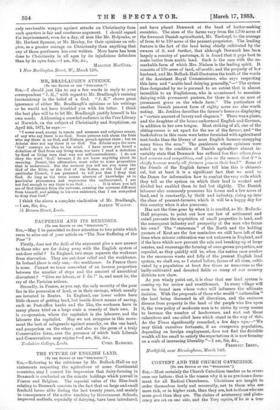THE FUTURE OF ENGLISH LAND.
[To THE EDITOR OP TER "SPECTATOR."]
Sia,—Referring to the criticisms by Mr. Bullock-Hall on my statements respecting the agriculture of some Continental countries, may I correct his impression that dairy-farming in Denmark is conducted on the minute holdings which prevail in France and Belgium. The especial value of the Blue-book relating to Denmark consists in the fact that on large and small freehold farms alike during the last twenty years, and mainly in consequence of the active teaching by Government Schools, improved methods, especially of dairying, have been introduced,
and have placed Denmark at the head of butter-making countries. The sizes of the farms vary from the 5,700 acres of the foremost Danish agriculturist, Mr. Tesdorpf, to the average of from 40 to 130 acres of the peasant-proprietor. The leading feature is the fact of the land being chiefly cultivated by the owners of it, and further, that although Denmark has beeu largely a country of pasturage, it is found that it pays best to make butter from arable land. Such is the case with the re- markable farm of which Mrs. Nielson is the leading spirit. It consists of 170 acres of land, all arable, and the property of lair husband, and Mr. Bullock-Hall illustrates the truth of the words of the Assistant Royal Commissioner, who says respecting this farm and "arable-land dairying generally,"—" The system thus designated by me is pursued to an extent that is almost incredible to an Englishman, who is accustomed to associate dairying with permanent pasture, for there is not an acre of permanent grass on the whole farm." The particulars of another Danish peasant farm of eighty acres are also worth noting. Mr. Jenkins describes the farmer's house as displaying a "certain amount of luxury and elegance." There was a piano,. and the daughter of the house understood English and German,. in addition to her own tongue. Most striking of all, one of the sitting-rooms is set apart for the use of the farmer; and "the bookshelves in this room were better furnished with agricultural text-books than the library of most English farmers occupying many times the area." The gentlemen whose opinions were- asked as to the condition of Danish agriculture almost in- variably state that Denmark has suffered less than others from bad seasons and competition, and give as the reason that it "is chiefly because nearly all farmers possess their land:" Some of the friends of the English farmer tell him this is chimeri- cal, but at least it is a significant fact that we send to. the Danes for information how to combat the very evils which they tell us the system on which their land is worked and divided has enabled them to feel but slightly. The Danish labourer also commonly possesses his house and a few acres of land, and is constantly, by thrift and industry, rising up into- the class of peasant-farmers, which it will be a happy day for- this country when it also possesses.
Has net the time gone by when it is needful, as Mr. Bullock- Hall proposes, to point out how our law of settlement and entail prevents the acquisition of small properties in land, and the consequent industry and prosperity of the man who farms his own ? The " statesmen " of the North and the holding- yeomen of Kent are the few reminders we still have left of the time when minute cultivation was not unknown in England, and if the laws which now prevent the sale and breaking-up of large- estates, and encourage the forming of over-grown properties, are repealed, as they quickkf will be, when .the nation once awakes to the enormous waste and folly of the present English land system, we shall see, as I stated before, farms of all sizes, culti- vated by a population at least five times as numerous as the- badly-cultivated and deserted fields so many of our country districts now show.
As you wisely point out, it is clear that our land system is
coming up for review and resettlement. In every village will soon be found Men whose votes will influence the ultimate decision. With the proposals of those who would " nationalise " the land being discuseed in all directions, and the ominous- divorce from property in the land of the people who live upon it, the true policy of moderate men is to strive by every means to increase the number of landowners, and root out those calamitous and one-sided laws which stand in the way of this.. As the Times significantly remarked, a few days ago,—" We may think ourselves fortunate, if an overgrown population,. depending on foreign employment, does not find the divisible- wealth all too small to satisfy the expectations it is now forming- on a scale of increasing liberality."—I am, Sir, &c.,
FREDERIC IMPEL.
Northfield, near Birmingham, March 14th.


































 Previous page
Previous page